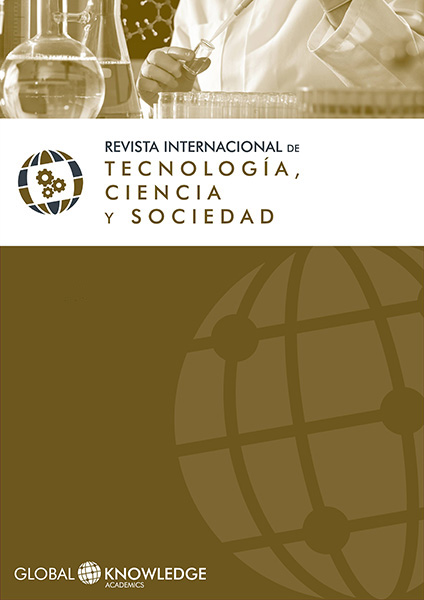Technological Surveillance and Responsible Scientific Strategy to Serve the Knowledge Society
DOI:
https://doi.org/10.37467/gka-revtechno.v5.461Keywords:
Technological Surveillance, Knowledge Society, Corporate Social ResponsibilityAbstract
The economic growth, human development and social welfare are based on the ability to generate, use and adapt knowledge as a productive force for the coexistence of peoplein certain environments. Research groups found in the knowledge society the opportunity to reduce social gaps, through socially responsible investigative processes that allow overcome poverty and regional development. The methodology was based on a bibliometric study with search equations and instruments such as documentary analysis and software of word mining, “Vantage Point”. Finally, a model of impact indica-tors on national and international publications on the topic Corporate Social Responsibility.
References
Comisión de las Comunidades Europeas. Libro Verde. Bruselas: Comisión de las Comunidades Europeas, 2001.
De la Cruz, Cristina, Pedro M. Sasia, y François Vallaeys. Responsabilidad Social Universitaria: manual de primeros pasos. México, D.F.: McGraw-Hill y BID, 2009.
Emerald Group. Advances in Sustainability and Environmental Justice. 2014. http://www.emeraldgrouppublishing.com/products/books/series.htm?id=2051-5030 (último acceso: 20 de septiembre de 2014).
ESMT. Sustainable Business Roundtable. 2014. https://www.esmt.org/school-networks/our-networks/sustainable-business-roundtable (último acceso: 20 de septiembre de 2014).
Ginés Mora, José. «La necesidad del cambio educativo para la sociedad del conocimiento.» Revista Iberoaméricana de Educación, 2004: 13-37.
León, Andrés Mauricio, Oscar Fernando Castellanos, y Freddy Abel Vargas. «Valoración, selección y pertinencia de herramientas de software utilizadas en vigilancia tecnológica.» Revista Ingeniería e Investigación, mayo 2006: 92-102.
Mateo, José Luis. «Sociedad del Conocimiento.» ARBOR ciencia, pensamiento y cultura, 2006: 145-152.
Muñoz, José Herman. Las revistas científicas colombianas. 2011. http://noticias.universia.net.co/vida-universitaria/noticia/2011/09/05/86698/revistas-cientificas-colombianas.html (último acceso: 20 de septiembre de 2014).
Ordoñez, G., A. Hernández, C. Henández, y C. Méndez. «Análisis bibliométrico de la Revista de Economía Institucional.» Revista de Economía Institucional, 2009: 309-353.
Organización Mundial de la Propiedad Intelectual - OMPI. «El papel de la información de pantentes en la planificación estratégica de centros de investigación y desarrollo.» Seminario Nacional de la OMPI sobre Propiedad Industrial, Inversiones e Información Tecnológica. 2002.
Palop, F., y J. M. Vicente. Vigilancia tecnológica e inteligencia competitiva: su potencial para la empresa española. Madrid: COTEC, 1999.
Pontificia Universidad Javeriana. Cuadernos de Administración. 2014. http://revistas.javeriana.edu.co/index.php/cuadernos_admon/ (último acceso: 24 de septiembre de 2014).
Santos, Gerardo. «Aproximaciones a un análisis bibliométrico de la Revista Internacional Legis de Contabilidad & Auditoria 2000-2012.» Revista Internacional Legis de Contabilidad & Auditoria, 2012: 183-226.
UNESCO. Gran programa 3: ciencias sociales y humanas. 2008. http://www.unesco.org.uy/institucional/es/institucional/la-organizacion/proyectos-yprogramas/gran-programa-3-ciencias-sociales-y-humanas.html (último acceso: 28 de mayo de 2013).
Universidad de Nottingham. International center for corporate social responsibility. 2014. http://nottingham.ac.uk/business/ICCSR/ (último acceso: 24 de septiembre de 2014).
Universidad EAFIT. Master en Negocios Internacionales: María Alejandra González-Pérez. 2014. http://www.eafit.edu.co/programas-academicos/posgrados/mib/faculty/paginas/MariaAlejandraGonzalezPerez.aspx#.VHvC9dJ5Mb0 (último acceso: 24 de septiembre de 2014).
Universidad Nacional de Colombia. Capacidades de investigación en la Universidad Nacional de Colombia 2000-2008: una aproximación desde el capital intelectual. Bogotá: Universidad Nacional de Colombia, 2009.
Downloads
Published
How to Cite
Issue
Section
License
Those authors who publish in this journal accept the following terms:
- Authors will keep the moral right of the work and they will transfer the commercial rights.
- After 1 year from publication, the work shall thereafter be open access online on our website, but will retain copyright.
- In the event that the authors wish to assign an Creative Commons (CC) license, they may request it by writing to publishing@eagora.org







